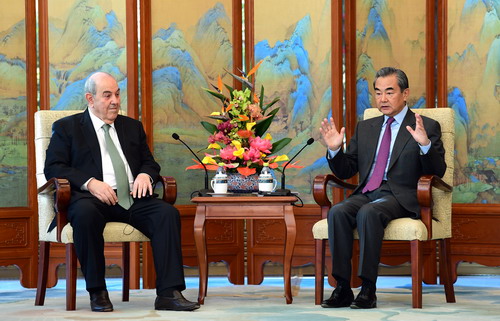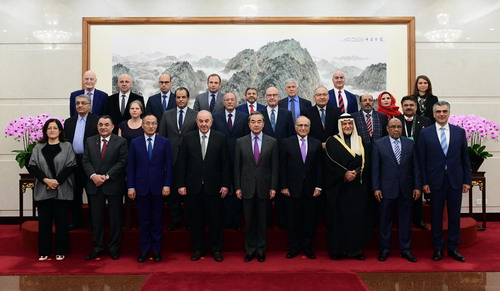
The People’s Republic of China



On November 27, 2019, State Councilor and Foreign Minister Wang Yi met with foreign guests attending the Middle East Security Forum in Beijing.
Wang Yi expressed, the Middle East is the major turbulent region in today's world. How to realize lasting peace in the Middle East is a topic of common concern of all countries in the region and the international community. In his speech at the opening ceremony of the eighth Ministerial Conference of the China-Arab States Cooperation Forum, President Xi Jinping proposed that we must reject the idea of absolute security at the cost of others and the zero-sum or self-supremacist mentality. Instead, we must together pursue common, comprehensive, cooperative and sustainable security. These are the Chinese solutions to the Middle East security.
Wang Yi said, common security means ensuring the security of all countries, rather than building the security of one country on the turbulence of others, or seeking absolute security of one side. Comprehensive security means not only seeking military security but also political stability as well as social stability. Cooperative security means pursuing security through political dialogue and multilateral cooperation instead of having blind faith in interfering with force or unilateral actions. Sustainable security requires equal emphasis to security and development. All countries should support security through development to provide security with internal dynamism, so that lasting security will be guaranteed.
Wang Yi pointed out, while we forge common, comprehensive, cooperative and sustainable security architecture in the Middle East, we must adhere to the right direction of political settlement in the first place. Solution through force is just like the footprint in the desert that cannot last long while external interference is like a tree without root that cannot survive. Only by advancing peaceful solution through political means can the vicious cycle of countering violence with violence be prevented. Only when all countries seek dialogue and cooperation in an inclusive spirit can they find a lasting solution to frictions.
Second, we need to champion the basic principle of safeguarding fairness and justice. As everything has its own merits, any solution should not deviate from fairness and justice. The sovereignty of all countries should be equal and should not be interfered. The national interests should be respected but not traded. Treaty of peace should be faithfully fulfilled rather than being damaged. International rule of law should be followed rather than being neglected. All these represent the most basic fairness and justice.
Third, we need to give play to the pivotal role of the United Nations (UN). We need to support the UN's efforts in mediating a series of hot-spot issues in the Middle East, implement all the resolutions passed by the UN Security Council to address the Middle East issue, enhance the UN's effectiveness and capability in participating in the Middle East affairs, and follow the purposes and principles of the UN Charter.
Fourth, we need to forge a synergy between the region and the international community. Regional countries should strengthen unity and dialogue to play a more important role in promoting security in the Middle East. The international community, some major countries in particular, should abandon geopolitical advantages and proceed from the well-being of the people of the Middle East, in a bid to play a constructive role in propelling peace in the Middle East.
Wang Yi noted, China never interferes in the internal affairs of the countries in the Middle East, and never seeks expansion or spheres of influence or geopolitical advantages. China has all along made its own judgment and upheld justice based on the merits of each particular case. China will firmly build peace, facilitate stability and contribute to development in the Middle East.
Foreign guests present thanked the Chinese side for holding the forum, and highly praised the Chinese side's significant and constructive role in peace and security in the Middle East. All parties expressed that Arab states generally hope to enter a new era of peace and stability. The current policies of the United States in the Palestinian and Syrian issues and other Middle East issues are worrisome. The peace and stability in the Middle East concerns world peace, and therefore requires enhanced coordination and support and negotiation of all countries to prevent the further deterioration of the situation in the Middle East.



